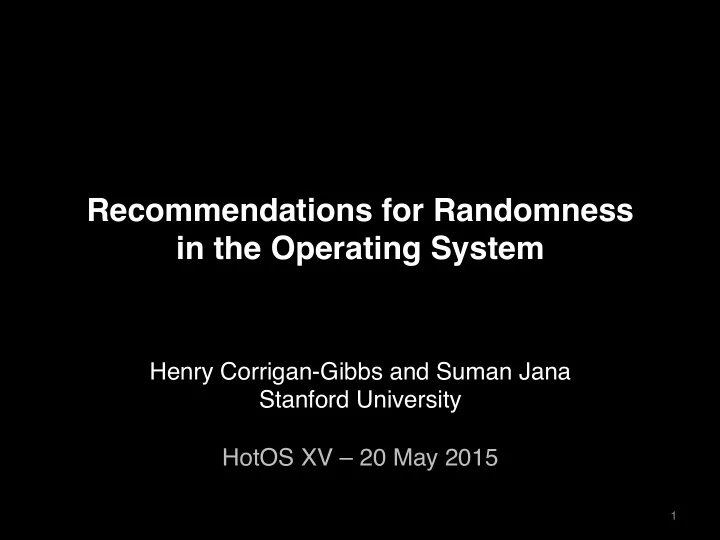

Recommendations for Randomness in the Operating System Henry Corrigan-Gibbs and Suman Jana Stanford University HotOS XV – 20 May 2015 1
2
GE Ethernet card Apple iOS Android Sandbox OpenSSL Firefox DNS resolver
In the past two years! [Everspaugh et al., Oakland ’14] [Garfinkel+Rosenblum, HotOS ’05] [Goldberg+Wagner, Dobbs ‘96] [Gutterman+Malkhi, CT-RSA’05 ] [Gutterman et al., Oakland ’06] [Heninger et al., USENIX Sec’12 ] [Lazar et al., APSys ’14] [Lenstra et al., 2012] [Ristenpart+Yilek, NDSS ’12] 4 [Yilek et al., IMC ’09]
Why so many bugs? Bad news: OS is a big part of the problem. Randomness subsystems have: • Buggy design • Error-prone APIs See paper • Misleading documentation Good news: The OS can be part of the solution! 5
What is entropy? It takes A around 2 k Password has k bits of ⇔ [guessing] entropy guesses to guess w.r.t. an adversary A your password Why do we need it? • Cryptographic secrets • ASLR • DNS source ports • Password salts • Etc. 6
Randomness pool Application reads /dev/random 7
Once the OS has accumulated enough entropy, it will never “run out” of entropy 256+ bits of seed randomness 011010100101110010101111011000011010111 8
Great! But what should the OS do before it has 256 bits in the pool? After first boot… . 9
State of the Art: Entropy Estimation 10
State of the Art 0111 “ 0111 ” 27 bits Ye Olde Entropy “2.3 bits” Estimator 11
State of the Art 1000 “ 1000 ” 29.3 bits Ye Olde Entropy “0.8 bits” Estimator 12
State of the Art 30.1 bits Ye Olde Entropy Estimator 13
State of the Art Block /dev/random until pool has 256+ bits X 30.1 bits Ye Olde Entropy Estimator 14
Entropy is a function of adversary’s knowledge Estimate could be: 256 bits Reality could be: 0 bits Ye Olde Entropy Estimator [Barak-Halevi CCS’05] [Dodis et al. CCS’13] [Kelsey et al., SAC‘00] 15
State of Entropy estimation the Art Long- Trusted vs blocking API untrusted inputs Entropy DoS attacks /dev/random vs. Slow /dev/urandom accumulation User-space randomness Chaos!!! pools 16
One Consequence: User-space Pools Reading many bytes from /dev/random can drive down entropy estimate and starve other processes Kernel Space User Space P1 ¡ P1 and P2 get same P2 “random” values! [CVE-2013-1445, CVE-2013-3599, CVE-2014-0016, CVE-2014-0017] ¡ 17
Our Proposal 18
Our Proposal Option 1: Strong Assumptions • Assume low-order bit of “ RDRAND ” has one bit of entropy • Easy! Just gather 256 samples, use them to seed a PRG What happens if your assumption is wrong? 19
20
Our Proposal Option 2: “Best-effort” entropy accumulation • Never estimate • Never block [Barak-Halevi CCS’05] [Dodis et al. CCS’13] [Kelsey et al., SAC‘00] • Any process can write into OS pool • Per-process pools [See paper for details] à Honest process’ pools will eventually accumulate entropy 21
Conclusions • Popular OSes make using randomness more difficult than it needs to be • Entropy estimation is at the heart of the problem Our Proposal • “Best effort” randomness • Never estimate, never block 22
23
Recommend
More recommend